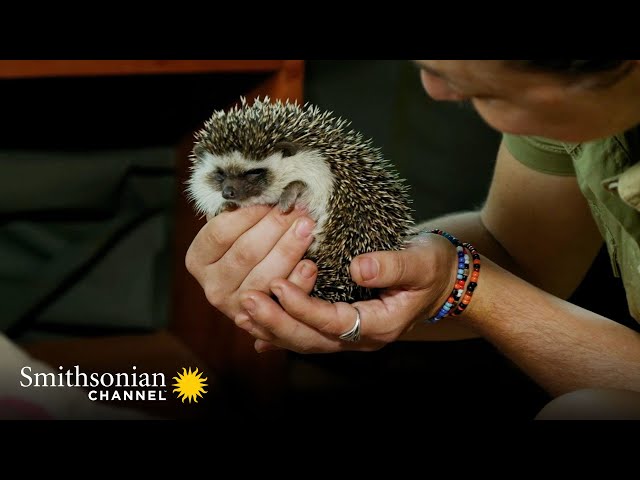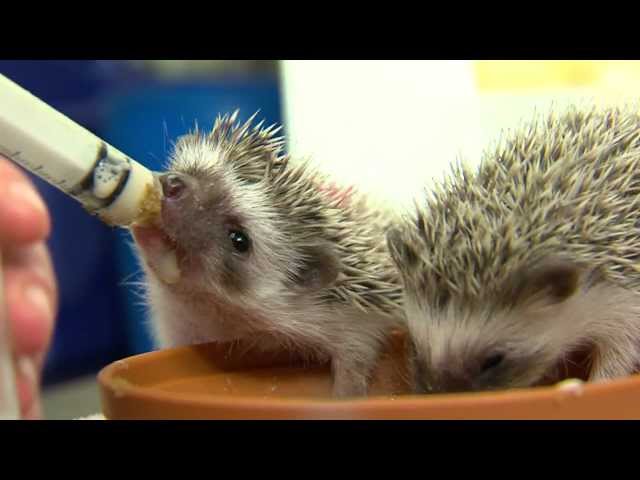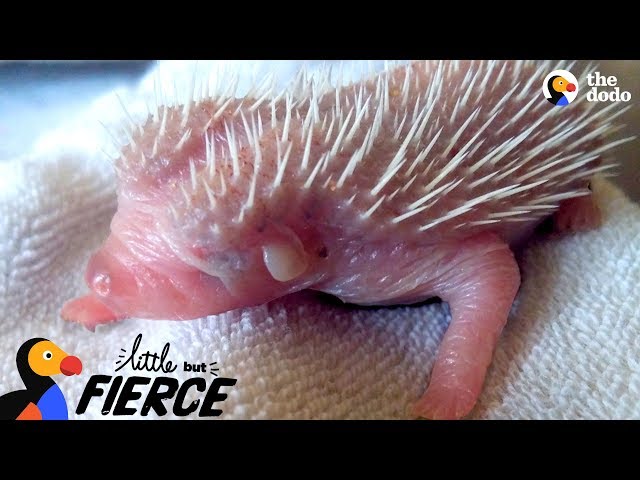0:00 – 6:13 Pet Hedgehogs
Caring for Pet African Pygmy Hedgehogs
0:52 diet
2:00 cage setup
3:22 handling
4:49 habitat
5:22 health and disease
Pet hedgehogs are unique animals so they also make unique pets. Not only do they eat a very different type of food when compared to other pocket pets, but they are covered with tiny little spikes and roll into balls when scared. Sonic the hedgehog may have been all blue and cool in the Sega video games but the real animals have their own special appeal that only hedgehog lovers can understand.
Hedgehog Statistics
Name: African pygmy hedgehog
Size: Five to eight inches long
Lifespan: Average of five years
As their name implies, African Pygmy hedgehogs are native to central and eastern Africa but most of these hedgehogs are actually a hybrid of two species – the Four-toed and Algerian hedgehogs. Their wild counterparts cover miles of ground each day in the wild where they can be found throughout Gambia, Mozambique, Somalia, and other African nations. In the wild they also live primarily off of small insects, grubs, snails, spiders, and small vertebrates – a diet we strive to mimic in captivity.
Hedgehog Diet
Unlike most other pocket pets, hedgehogs are considered insectivores and these snouted critters have quite the taste for things that creep and crawl. Mealworms and crickets are the most commonly fed insects in captivity but the staple diet for a hedgehog should be a store-bought, specially formulated hedgehog kibble. This kibble has mashed up insects along with vitamins and minerals to create a balanced diet specifically formulated for an African pygmy hedgehog. Many owners and breeders still feed kitten food to their hedgehogs but this is not ideal since cat food does not contain blood meal and chitin in it.
Keeping Hedgehogs as Pets
Cages made for guinea pigs and rabbits are suitable for hedgehogs but wire grate cage bottoms should be avoided since hedgehogs have small feet that will be injured if they fall through these grates. A soft bedding such as a recycled paper material or towels that are changed out regularly are best for the sensitive feet of a hedgehog.
A large enclosed running wheel should be kept in the cage for your hedgie to exercise in along with a hide box, food bowl, and water bottle. Make sure the running wheel is cleaned regularly to avoid fecal matter from building up which can cause foot infections.
Hedgehogs are very active at night and will run several miles a day on their wheel or in their enclosed play area. If they are unable to get the large amount of exercise they require they may become depressed, overweight, and develop foot sores. Exercise and activity is very important to hedgehogs so potential owners should be able to commit to be able to provide a hedgehog with the space necessary to do so.

Handling
African pygmy hedgehogs obviously have a lot of prickly spines but that doesn’t mean they aren’t fun to hold. Tame hedgehogs will crawl into your hands, take treats from you and even enjoy being carried for a bit. Younger hedgehogs are easier to tame than older ones, therefore your best chance to having a hedgehog that loves being held is by getting one at about six to eight weeks of age.
Typically, hedgehogs don’t like their heads being pet and will roll into spiked balls when scared. Since hedgehogs aren’t big fans of water, if you are having trouble cleaning your hedgehog’s feet, try placing it in a shallow bath where just its legs are immersed in water or have it walk on a wet towel.
Hedgehog Health
Dental disease, skin issues including mite and lice infestations, intestinal parasites, and tumors can all be issues for pet hedgehogs. Spaying and neutering is recommended to avoid reproductive organ tumors and other diseases later in life. Thorough dental examinations at the yearly vet visits and the occasional dental cleaning under anesthesia is recommended to prevent your hedgie from losing any teeth or developing other dental problems. Some owners are able to brush their hedgehog’s teeth using cat toothpaste and small head toothbrush or cotton tipped applicator weekly but this is very uncommon.
Spine loss is normal in small amounts but if your hedgehog is losing so many spines that it has bald patches it probably has a medical concern. Parasite infestations such as mites are the most common reasons for excessive spine loss. If your hedgehog is losing a lot of spines then it’s time for a check-up with the vet.
Follow us on Instagram :. https://www.instagram.com/shadowpetindia/
Email me : shadowpet100@gmail.com
For any information
Like comment share




